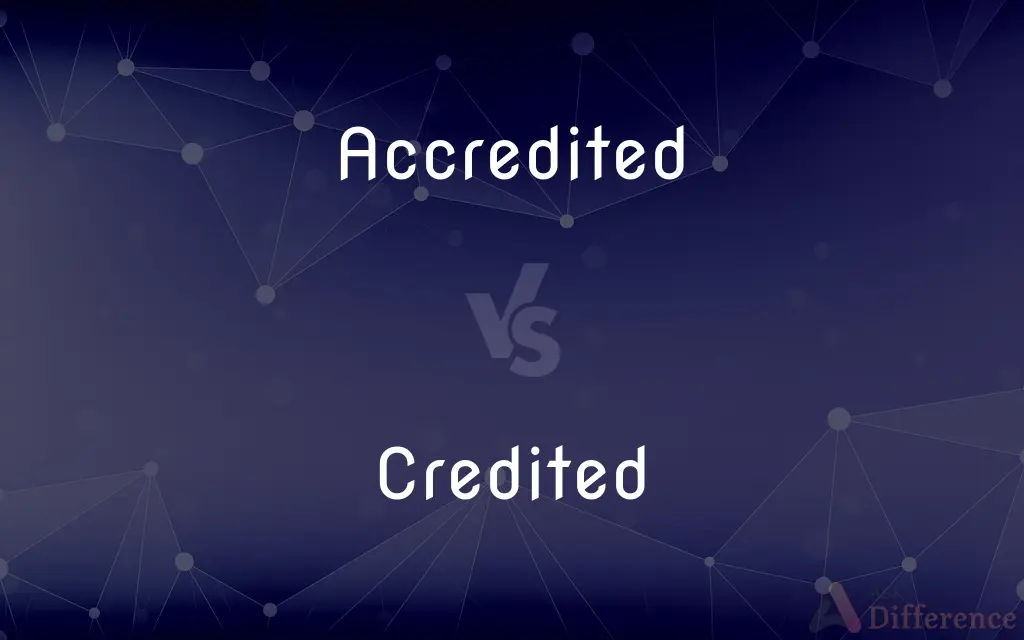Accredited vs. Credited — What's the Difference?
By Maham Liaqat & Fiza Rafique — Updated on March 11, 2024
Accredited refers to the official recognition granted to an entity for meeting certain standards, while credited means to acknowledge or attribute something to someone or something.

Difference Between Accredited and Credited
Table of Contents
ADVERTISEMENT
Key Differences
Accredited is often used in contexts where institutions, programs, or individuals receive formal validation from authoritative bodies, indicating compliance with established criteria or standards. This process involves evaluation and confirmation that specific requirements are met, such as in education, where schools or programs are accredited by educational bodies. On the other hand, credited involves recognizing or attributing achievements, contributions, or efforts to an individual or entity, often without the formal process that accreditation entails.
Accreditation is a status that needs to be maintained and can be subject to periodic review to ensure ongoing compliance with the set standards. For example, universities undergo regular accreditation processes to ensure their educational offerings remain at a high quality. Conversely, being credited for something, like an idea, invention, or contribution, does not usually require renewal or continuous verification.
In the academic world, accredited institutions are recognized for meeting specific educational standards, which can affect the validity of degrees and the transferability of credits. Meanwhile, being credited in an academic context often refers to the acknowledgment of one's contributions to a project, research, or publication.
Accreditation often involves a comprehensive evaluation by an external body, which can include site visits, review of materials, and assessment of outcomes. This contrasts with being credited, which can be as simple as a mention or acknowledgment in a document, presentation, or public forum, and does not involve a detailed assessment process.
While accreditation is crucial for institutions and programs to gain trust and legitimacy, being credited is important for individuals and entities to gain recognition and respect for their contributions, ideas, or intellectual property.
ADVERTISEMENT
Comparison Chart
Definition
Official recognition for meeting specific standards.
Acknowledgment or attribution of contributions or efforts.
Process
Involves formal evaluation and approval by authoritative bodies.
Can be informal, often as simple as a mention or acknowledgment.
Renewal/Review
Subject to periodic review to ensure ongoing compliance.
Does not typically require renewal or continuous verification.
Contexts
Common in education, professional certifications, and institutions.
Widespread across various fields for acknowledging contributions.
Importance
Provides legitimacy and trust in the quality of services or education.
Recognizes and respects individual or group contributions.
Compare with Definitions
Accredited
Formally recognized as meeting certain criteria.
The university is accredited by the regional education authority.
Credited
Acknowledged for one's role or contribution.
She was credited with pioneering the new research method.
Accredited
Granted official approval to operate or function.
The laboratory was recently accredited for its high standards.
Credited
Attributed to a particular cause or source.
The success of the project was credited to the team's hard work.
Accredited
Endorsed by a reputable organization.
Our program is accredited by the national engineering association.
Credited
Recognized for creating or inventing something.
The scientist is credited with the groundbreaking discovery.
Accredited
Having passed a thorough evaluation.
The hospital became accredited after a comprehensive review of its services.
Credited
Given recognition or praise.
He was credited for his honesty and integrity in the investigation.
Accredited
Certified as competent or legitimate.
The agency is accredited to conduct safety inspections.
Credited
Assigned merit or acknowledgment.
The author is credited for influencing an entire genre of literature.
Accredited
To ascribe or attribute (something) to someone
The invention of the lightning rod is accredited to Franklin.
Credited
An arrangement for deferred payment of a loan or purchase
A store that offers credit.
Bought my stereo on credit.
Accredited
To give credit to
The writer who is accredited with having written the piece.
Credited
The terms governing such an arrangement
Low prices and easy credit.
Accredited
To certify as meeting prescribed standards or requirements, as of a profession
A school that is accredited by the state's board of education.
Credited
The time allowed for deferred payment
An automatic 30-day credit on all orders.
Accredited
To supply with credentials or authority, as of a government
Accredit an envoy.
Credited
The deduction of a payment made by a debtor from an amount due.
Accredited
Simple past tense and past participle of accredit
Credited
The positive balance or amount remaining in a person's account.
Accredited
Given official approval after meeting certain standards, as an accredited university; or as disease free cattle.
Credited
A credit line.
Accredited
Given official approval to act;
An accredited college
Commissioned broker
Licensed pharmacist
Authorized representative
Credited
Reputation for solvency and integrity entitling a person to be trusted in buying or borrowing
You should have no trouble getting the loan if your credit is good.
Credited
Official certification or recognition that a student has successfully completed a course of study
He received full credit for his studies at a previous school.
Credited
A unit of study so certified
This course carries three credits.
Credited
Often credits An acknowledgment of work done, as in the production of a motion picture or publication
At the end of the film we stayed to watch the credits.
Credited
Influence based on the good opinion or confidence of others
Used his credit with the police to get them to devote more time to the case.
Credited
Recognition or approval for an act, ability, or quality
Gave them credit for a job well done.
Credited
A source of honor or distinction
This exceptional athlete is a credit to our team.
Credited
A reputation for sound character or quality; standing
It is to their credit that they worked so hard without complaining.
Credited
Belief or confidence in the truth of something
"They give no credit to [his] scurrilous assertions" (John Edgar Wideman).
Credited
To give as a credit
Credited $500 to her account.
Credited
To give a credit to
Credit an account.
Credited
To give or award an educational credit to.
Credited
To regard as having performed an action or being endowed with a quality
Had to credit them with good intentions.
Credited
To ascribe or attribute
Credit the invention to him.
Credited her recovery to an innovative treatment.
Credited
(Archaic) To bring honor or distinction to.
Credited
Having something attributed to oneself.
He was credited with the invention of the alarm clock.
Credited
Past participle of credit
Credited
(usually followed by `to') given credit for;
An invention credited to Edison
Common Curiosities
What does it mean for an institution to be accredited?
An institution is accredited when it has been formally evaluated and recognized by an authoritative body for meeting specific standards and criteria.
Can an individual be accredited?
Yes, individuals can be accredited in certain contexts, such as professional certifications, where they meet established standards in their field of expertise.
What is the difference between being credited as an author and being an accredited author?
Being credited as an author means being acknowledged for writing or contributing to a work, whereas there's no formal status as an "accredited author" in typical contexts; however, authors can be accredited or certified in their professional capacities, such as journalists.
Why is accreditation important for universities?
Accreditation is important for universities as it ensures the quality of education provided meets national or international standards, affecting degree validity and credit transferability.
How does someone get credited for their work?
Someone gets credited for their work through acknowledgment or attribution of their contributions, efforts, or achievements in a particular field or project.
Is it possible for a contribution to be uncredited?
Yes, contributions can be uncredited when an individual's efforts or roles are not formally acknowledged or recognized in the final work or project.
Can an institution lose its accreditation?
Yes, an institution can lose its accreditation if it fails to maintain the standards required by the accrediting body or during periodic review processes.
How do organizations become accredited?
Organizations become accredited through a formal evaluation process by an authoritative body, which assesses whether they meet specific criteria and standards.
How does being credited affect an individual's professional reputation?
Being credited enhances an individual's professional reputation by formally recognizing their contributions, skills, and achievements, adding to their credibility in their field.
Are there different levels of accreditation?
Yes, there can be different levels of accreditation, such as regional, national, or program-specific, each with its own set of standards and scope.
What role do accrediting agencies play?
Accrediting agencies establish standards, conduct evaluations, and grant accreditation to institutions or programs that meet their criteria, ensuring quality and compliance.
Is accreditation mandatory for all educational institutions?
While not mandatory for all institutions, accreditation is crucial for credibility, quality assurance, and in many cases, eligibility for federal funding and student aid.
How can individuals ensure their contributions are properly credited?
Individuals can ensure their contributions are properly credited by clearly documenting their roles, communicating with stakeholders, and using formal agreements when necessary.
Can a project or work be credited to multiple individuals?
Yes, a project or work can be credited to multiple individuals, acknowledging the collaborative effort and contributions of each person involved.
What happens when a contribution is wrongly credited?
When a contribution is wrongly credited, it can lead to disputes, ethical concerns, and may require correction to properly acknowledge the rightful contributors.
Share Your Discovery

Previous Comparison
Intricate vs. Delicate
Next Comparison
Pointer vs. ReferenceAuthor Spotlight
Written by
Maham LiaqatCo-written by
Fiza RafiqueFiza Rafique is a skilled content writer at AskDifference.com, where she meticulously refines and enhances written pieces. Drawing from her vast editorial expertise, Fiza ensures clarity, accuracy, and precision in every article. Passionate about language, she continually seeks to elevate the quality of content for readers worldwide.














































